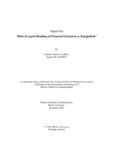| dc.contributor.advisor | Islam, SM Parvej | |
| dc.contributor.author | Saheel, Fahim Ashab | |
| dc.date.accessioned | 2021-07-26T16:45:39Z | |
| dc.date.available | 2021-07-26T16:45:39Z | |
| dc.date.copyright | 2020 | |
| dc.date.issued | 2020-12 | |
| dc.identifier.other | ID 18164073 | |
| dc.identifier.uri | http://hdl.handle.net/10361/14824 | |
| dc.description | This internship report is submitted in partial fulfillment of the requirements for the degree of Masters of Business Administration, 2020. | en_US |
| dc.description | Cataloged from PDF version of internship report. | |
| dc.description | Includes bibliographical references (page 36). | |
| dc.description.abstract | This internship report summarizes the role of Agent Banking in financial inclusion in Bangladesh. Amidst the COVID-19 pandemic, agent banking in Bangladesh has continued to grow in all dimensions during this entire quarter. Up to September 2020, 24 banks in Bangladesh have undertaken agent banking operations, the number of agents has grown by 15.96% and the number of outlets has grown by 12.59% throughout this quarter. By comparing the figures before and after the pandemic we can see a positive growth in every segment of Agent Banking. The persistent positive growth of agent banking accounts amidst Covid-19 pandemic throughout the last quarter indicates the surging demand of agent banking services across different segments of population. The share of female accounts opened through agent banking is also very promising, as the gap between male and female accounts is narrowing down gradually signifying the increased participation of females in the formal financial system. The volume of deposit has increased by 27.60% while the volume of loans has increased by 50.85% overall. The amount of inward remittances distributed by the agent outlets has increased notably by 43.84% than before. This remarkable remittance inflow was possible due to the government’s initiative of 2% cash incentive as well as some banks’ enthusiastic initiative of 1% more cash incentive on the remittance sent by the expatriates through agent banking. We can say the Govt. is quite successful on discouraging the ‘hundi’ among the expatriates as now they are sending remittance through proper banking channel. This overall report very much indicates that financial services through agents are truly reaching the underprivileged segments of the society even in the pandemic situation. Thus helping our economy boom with the help of our rural economy whom were once unbanked and ignored. | en_US |
| dc.description.statementofresponsibility | Fahim Ashab Saheel | |
| dc.format.extent | 36 pages | |
| dc.language.iso | en | en_US |
| dc.publisher | Brac University | en_US |
| dc.rights | Brac University Internship reports are protected by copyright. They may be viewed from this source for any purpose, but reproduction or distribution in any format is prohibited without written permission. | |
| dc.subject | Agent banking | en_US |
| dc.subject | Financial organization | en_US |
| dc.subject | Financial inclusion | en_US |
| dc.subject.lcsh | Banks and banking--Bangladesh | |
| dc.title | Role of agent banking in financial inclusion in Bangladesh | en_US |
| dc.type | Internship report | en_US |
| dc.contributor.department | Brac Business School, Brac University | |
| dc.description.degree | M. Business Administration | |

